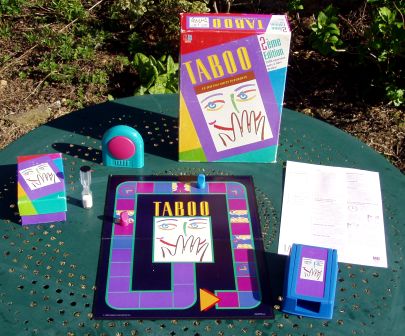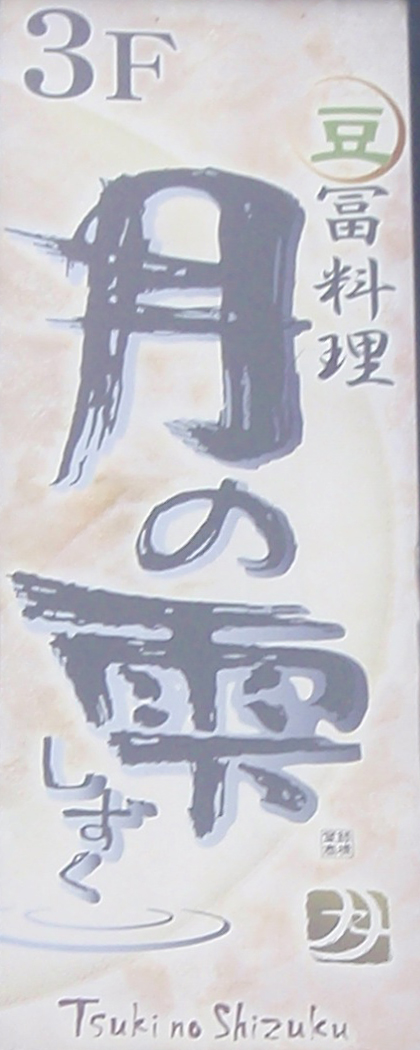Very Superstitious, Writing's on the Wall
I've learned a new word:
忌み言葉 (いみことば: (1) taboo word; (2) euphemism used in place of a taboo word)
taboo + word (last 2 kanji)
Two things jump out at me. First, if I heard the term いみことば, I would feel certain that the いみ corresponded to 意味 (いみ: meaning), but no.
Second, 忌み言葉 means one thing and its opposite at the same time. When an 忌み言葉 could make others uncomfortable, just substitute an 忌み言葉. That's very confusing!
It turns out that the Japanese have a host of taboo words and euphemistic replacements. When words have associations with blood, death, and the like, people consider them to be unclean and therefore taboo. On occasions fraught with anxiety, such as important exams, the Japanese also avoid words that create the image of failing. And at weddings, people dance around terms associated with separation and divorce.

Photo Credit: FH
The following term lies at the heart of this topic:
連想 (れんそう: association (of ideas); being reminded (of something); suggestion)
link + thinking of
The kanji break down quite logically, suggesting to me a free-associative state of mind, the kind that accompanies creative bursts. Not quite. Rather, because we're dealing with taboos, the matter of replacing one Japanese word with another is a fear-driven phenomenon.
We all know about the Japanese avoidance of the unlucky 四 (four). After all, its on-yomi of シ sounds like 死 (し: death). Similarly, it's no secret that people associate 九 (ク) with 苦しむ (くるしむ: to suffer). But imagine my surprise to find on Wikipedia that some of the words people use all the time are on the no-no list. Let's look at a handful.
仕事 (しごと: work)
The yomi of this word brings to mind 死後 (しご: after death), so people prefer these substitutes:
働き
役目 (やくめ: duty, business, role)
役割 (やくわり: part, role, duties)
ワーク
ジョブ
The last two come from "work" and "job." People would rather use English-derived terms when 仕事 feels quintessentially Japanese?!
猿 (さる: monkey)
Oh my goodness. The first sample essay on Joy o' Kanji is all about 猿. I've chosen something unlucky! But what could be unlucky about a monkey?
Hey, I can think of one thing. On a Costa Rican road several years ago, monkeys charmed many of us by doing daredevil tricks from telephone wires. Drivers stopped to take pictures.

Photo Credit: Eve Kushner
It turns out that even while doing aerial stunts, monkeys may need ... shall we say ... "relief" (as long as we're using euphemisms). Unfortunately, they're a damn sight messier than birds:

Photo Credit: Eve Kushner
Back to Japan. For Japanese people the word 猿 (さる) brings to mind 去る (さる: to leave; go away). Some people therefore refer to monkeys with the following term:
得手 (えて: forte, strong point)
A few notes about this less-than-logical substitution:
• People usually write this term as エテ. Up till now, my proofreader was unaware that this yomi came from 得手.
• He has no idea why a word meaning "forte, strong point" would be a euphemism for "monkey."
• When people use 得手 or エテ to refer to monkeys, they usually add the suffix -公 (-こう), which conveys contempt. (To add to all this confusion, the same suffix can also convey endearment. That's true in ハチ公, the term widely used for the famous dog Hachi, best known as Hachiko.)
豆腐 (とうふ: tofu)
Tofu, one of the prides of Japan, has an unfortunate kanji combination, in that 腐 can mean "rotten." People therefore like to write this term as 豆富 (とうふ), where the second kanji means "wealth, abundance." To my amazement, 豆富 is the first kanji version listed in Breen; 豆腐 comes second. It's not surprising that a repulsive "ingredient" in a word as important as 豆腐 should be overwritten with a much cheerier kanji. I just wonder why I didn't get the memo.
Oh, wait, I have come across 豆富. I wrote about the following photo in essay 1640 on 豆 (bean):

Photo Credit: Eve Kushner
塩 (しお: salt)
Salt! You're supposed to call it "the flower of a wave" (浪の花, なみのはな). That's because しお reminds people of 死 (し: death). Fine, but does "flower of a wave" suggest salt to you? Instead, I think of seaweed or maybe foam or even a surfer!
醤油 (しょうゆ: soy sauce)
Get this. Even though 醤油 is pronounced しょうゆ, which starts with し (the death thing again), some people would rather call soy sauce むらさき! They do this even though しょうゆ never for a second sounds like し. I don't know.... The first kanji in 醤油 is non-Joyo, but even that's not nearly a good enough reason to shun this utterly Japanese word!
As you know, むらさき means "purple." Some Japanese people perceive soy sauce as purple. One often hears this word at sushi bars, says my proofreader.
今日 (きょう: today)
You have got to be kidding me! People say that this word brings to mind 凶 (きょう: bad luck). Really? The incredibly common きょう makes people think of 凶 before 今日?! Even if I were having a spate of bad luck—even if monkeys shat on my car and all my tofu rotted—I wouldn't think of 凶 before 今日. Okay, maybe that's because I'm unfamiliar with 凶, but still!
Anyway, it's recommended that you use 本日 (ほんじつ: today) instead of 今日. Alternatively, you could simply read 今日 as こんにち, which also means "today," as well as "these days." By the way, ほんじつ and こんにち are more literary than きょう and are preferred for formal occasions, such as celebrations.
カラオケ (karaoke)
Even though it's a coinage (that is, an intentional creation), the word カラオケ can nevertheless cause problems on celebratory occasions because it might bring to mind the emptiness of 空 (から)! Yes, indeed, the term derives from "空 (empty) + orchestra." It's supposed to be empty!
People don't ordinarily avoid the word カラオケ, and they also don't shy away from doing karaoke at celebrations, such as weddings. However, at such times people refer to it as 歌を歌う (うたをうたう: to sing a song). My proofreader explains that, aside from tiptoeing around the taboo, people would say 歌を歌う at such times because singing is something done for oneself and for others, whereas カラオケをする sounds like you're doing it for yourself.
鉄 (てつ: iron)
Okay, I wasn't too sympathetic to the complaint about カラオケ, but 鉄 is a different matter. It has no problematic sounds such as し. Instead, you can see the issue when you separate this kanji into components. That is, 鉄 looks like the following:
金を失う (かねをうしなう: to lose money)
Because of this taboo, some railway companies and iron manufacturing companies substitute the non-Joyo 鐡 (テツ: iron) in their names. That's the old form of 鉄.
For Real?
Incredulous about all of this, I asked my proofreader how seriously anyone takes these issues. How often does he hear these workarounds? And is this a new fad or something very old?
He responded that because this kind of paraphrasing applies to both old and new terms, he thinks this tendency has been around for quite awhile. It’s very hard to tell whether people are avoiding specific terms, he noted, except when the euphemisms sound quite unusual. Here are the substitutes he hears most often:
• ほんじつ or こんにち. But since these are very common terms, he can't be sure whether or not the person was avoiding きょう.
• むらさき. This is often used in sushi places. He has always perceived it as sushi jargon and was unaware that it was supposed to be a euphemistic replacement for 醤油.
By contrast, he says, he has never heard anyone use 浪の花 to mean “salt.” In fact, the phrase 浪の花 itself is new to him.
New Essay: 塀
Essay 1777 on 塀 is now out, as of today. Have a look-see:

The essay includes a passage from Donald Richie's Tokyo: A View of the City, in which he explains the role of fences and boundary walls in Japanese culture. To do so, he quotes Kurt Singer: "No people could be less entitled to complain of being misunderstood, unknown, or neglected than the Japanese, whose first and last urge is to lead a life unseen by others.... [Japanese people] make a network of walls and fences behind which to retire: unwritten rules, ceremonies, and taboos."
Aha! Taboos again! Yes, indeed!
One more overlap: The title of this entry is "Very Superstitious, Writing's on the Wall," alluding to a Stevie Wonder song. Where's that writing again? On the wall! If he had said "off the wall," it would have been a perfect fit (but would have made little sense!).
Have a great weekend. Just to be on the safe side, avoid all words containing し or even "she"!

Comments